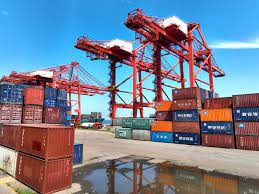Bangladesh’s ocean freight charges have registered a 50% fall from the pandemic-led massive surges as global trade slows because of shrinking demand for goods paired with rising inflation and inventory excesses in destination countries.
Vessel operations on the Chattogram-Europe route now cost $6,000-7,000 per 20-foot container in contrast to $12,500 in December 2021 when the pandemic was at its peak. Similarly, a US-bound ship now charges $10,000 per 20-foot container, down from $20,000, according to the Shipping Agents’ Association.
The easing in supply chain disruptions, which had been built up over the pandemic, is also driving the significant fall in freight rates, industry people say.
But businesses note that they are still paying at least three times more than they did before Covid-19 caused a snarling of global supply chains.
In pre-Covid times, shipment of a 20-foot container would cost $2,500 to Europe and $3,000 to the United States.
Syed Mohammad Arif, president of Shipping Agents’ Association, told The Business Standard that softening demand amid the ongoing global slowdown is a major reason behind a significant decrease in freight rates.
Consumers in Europe and the US have cut back on their spending on clothing and other luxury items under record-high inflationary pressure. That is why booking goods on shipping lines has now dropped by 30-40%, he noted.
G20 merchandise trade growth slowed markedly in value terms in the second quarter of 2022, as measured in current US dollars.
Exports and imports rose slightly by 2.1% and 2.6%, respectively, as compared to 4.8% and 6.2% in the previous quarter, according to G20 international trade statistics released by the OECD on Monday.
Almost 60% of British shoppers say they will cut back on non-food spending in the so-called “golden quarter” – the last three months of the year when most retailers make the majority of their profits, according to research by Retail Economics with the retail technology firm Metapack.
British shoppers are likely to spend £4.4bn less on non-essentials during this period, down 22% on the same quarter in 2021, the report said.
This is a significantly larger drop than other European countries, with an expected drop in spending of 14% in Spain, 12.3% in Italy, 11.5% in France and 9.4% in Germany.
After two years of skyrocketing expenses, the reduction in shipping costs is good news for both exporters and importers. They hope this will have a positive impact on local markets.
But exporters cannot capitalise on falling freight charges because global demand for their goods has fallen in their destination countries amid soaring inflation fuelled by the Russia-Ukraine war, Mohammad Hatem, executive president of Bangladesh Knitwear Manufacturers and Exporters Association, told TBS.
Rakibul Alam Chowdhury, vice-president of Bangladesh Garment Manufacturers and Exporters Association, said falling freight charges will take some pressure off apparel buyers who carry shipment costs.
Meanwhile, export-import activities through Chattogram port fell in September this year. The port handled 1,11,493 twenty-foot equivalent units (TEUs) of imported goods in the month in contrast to 1,20,470 TEUs in the same time in 2021. On the other hand, the handling of exported goods stood at 63,803 TEUs, down from 68,891 TEUs the same month a year ago.
Khairul Alam Sujan, vice-president of Bangladesh Freight Forwarder Association, told TBS that shipping companies had astronomically hiked freight charges, cashing in on the pandemic-led crisis, which eventually fed into prices of all essential products.
But now the situation has changed a bit and the shipping charges are returning to a competitive state, he added.
Source: Hellenic Shipping News






